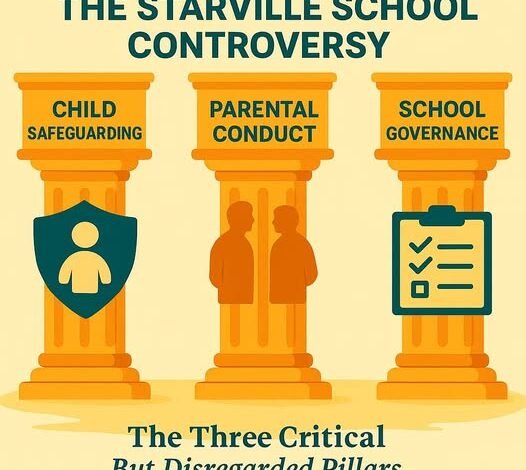The Starville School Child-and-Teacher Abuse Controversy: A Dispassionate and Preliminary Professional (Child Safeguarding, Protection, and Legal) Analysis

The disturbing video emerging from Starville School in Abuja has triggered national outrage, and rightly so. In the clip, parents of a child, who alleged that their child was slapped by a teacher are seen physically assaulting the teacher. This is not merely a case of misconduct; it is a window into the deeper structural failures of Nigeria’s school system.
My analysis rests on three pillars: child safeguarding, parental conduct, and school governance. Each must be examined clearly and without prejudice.
- The Child Safeguarding Dimension: The Teacher’s Conduct
If the video is indeed authentic, as the lawyers representing the parents assert, then the teacher’s conduct is unequivocally wrong. The teacher openly admitted to slapping the child because, according to him, the child “shoved him aside twice.” That admission alone is damning.
Under no circumstance should a teacher strike a child. No provocation justifies it. Teachers are duty bearers, adults empowered by law, entrusted by parents, and bound by professional ethics to act as custodians, not aggressors.
This incident is not a “momentary lapse in judgment”; it exposes the absence of systemic safeguards. For 25 years, since my earliest work with schools in 1997 and with private institutions like Atlantic Hall in 2000, I have consistently observed that only a small percentage of Nigerian schools have functional safeguarding systems.
High tuition does not safeguard children. Beautiful buildings do not safeguard children. Elite branding does not safeguard children.
Only codified child safeguarding policies, trained personnel, monitoring structures, and a culture of protection can safeguard children.
There is also a broader structural problem: Who is regulating our schools? Government? The same government that struggles to regulate its own schools? The result is an educational ecosystem flooded with private schools, from the mushroom to the magnificent with no uniform safeguarding standards.
The only credible regulator in this context should be parents, organized as strong, functional PTAs. But in many Nigerian schools today, genuine PTAs, independent, empowered, and informed, barely exist.
- The Parental Conduct Dimension: Jungle Justice Is Not a Remedy
The conduct of the parents is also unacceptable. They appear in the video physically assaulting the teacher multiple times. Their anger is understandable. Their disappointment is legitimate.
Their sense of betrayal is real.
But jungle justice is never a lawful or moral response.
Adults cannot model violence as an acceptable reaction to wrongdoing. If parents take the law into their own hands, what message do they send to the very child they hope to protect? That violence is justified when one is enraged? That the law is optional?
A society that normalizes retaliation becomes unsafe for children and adults alike.
- The School Governance Dimension: The Alleged Release of the Video
Third, and perhaps most troubling, is the allegation by the parents’ lawyers that the school released the video to the public. If true, this is a grave breach of confidentiality.
The school–parent relationship is fiduciary and sacred. Matters involving children, their parents, or any form of conduct or misconduct must be escalated through proper channels, internal procedures, regulators, law enforcement agencies, or the courts. Social media should never be the first point of call.
Those circulating the video, including educationists, have also become complicit in breaching the rights and confidentiality owed to the child, the parents, and even the teacher. There is no justification for distributing a clip that depicts nothing but violence, thereby exposing other children to unnecessary psychological risk. There is simply no reason for it.
They are not to be tried on social media.
The temptation for schools to “clear their name” online often leads to reputational self-destruction and further harm to the child involved.
Conclusion: Three Failures, One Systemic Crisis
This case exposes three simultaneous failures:
- A teacher who violated professional ethics
- Parents who embraced unlawful retaliation, and
- A school that may have mishandled confidential material.
Each failure is symptomatic of a larger national problem: Nigeria lacks a comprehensive, regulated, child-centred schooling system.
As we say in our work, enlightenment is superior to enforcement®. Systems, culture, and people not sentiments, safeguard and protect our precious children.
Until Nigerian schools embrace structured safeguarding and parents embrace lawful remedies, we will continue to circle these avoidable tragedies.
Do have an INSPIRED weekend with the family.





